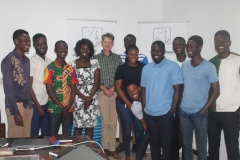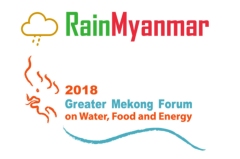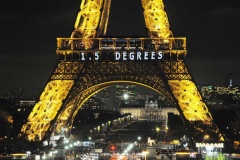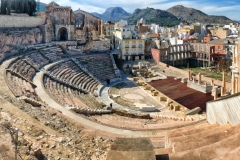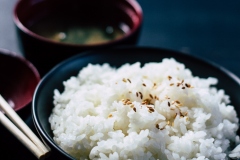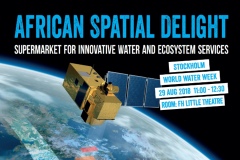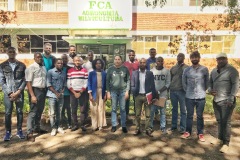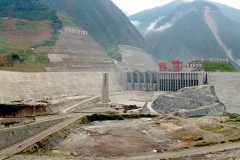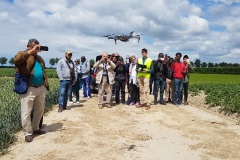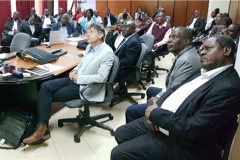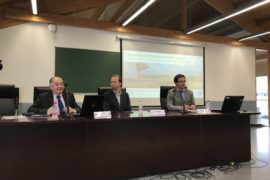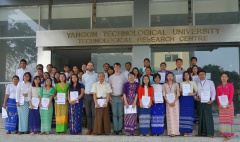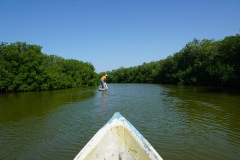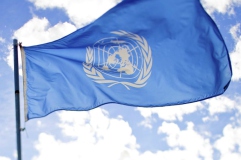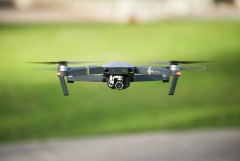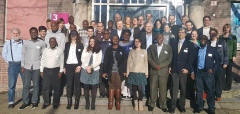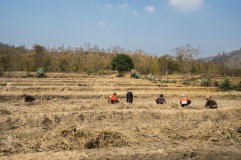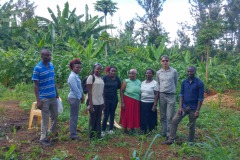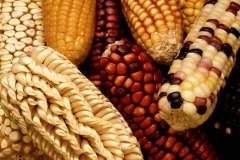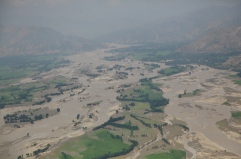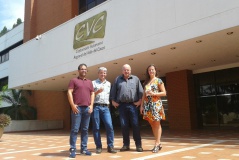Noticias 2018
28 diciembre 2018
TWIGA Blog: Successful drone training at KNUST in Kumasi, Ghana
Eleven motivated participants. A Flying Sensor. A challenging task to perform. Perfect facilities (Thank you Mr Isaac Duodu from Kumasi Business Incubator!). The right assistance (Mr Joel Budu from Farmerline!). That’s what it takes to perform a week’s training and finish it successfully. Coming from different professional backgrounds most of the trainees did not know...
11 diciembre 2018
Socio-economic development is the key driver for the future South Asian water gap
The current United Nations Climate Change Conference COP24 held in Katowice, Poland once more demonstrates the world’s climate change concerns. In the Indus, Ganges, and Brahmaputra river basins, a global climate change hotspot and home for about 900 million people, these concerns are pressing, since the river systems provide water resources for the important agricultural,...
7 diciembre 2018
Satellite technology and drone images to reduce groundwater use in Iran
The SMART-WADI project (SMART Water Decisions for Iran), carried out by a consortium of FutureWater, IHE-Delft, and local partner EWERI, focuses on farmers who irrigate their crops with groundwater. The aim is to provide up-to-date information and advice on water productivity, irrigation and farm management. The project combines the latest satellite technology for the quantification...
30 noviembre 2018
FutureWater to launch RainMyanmar at the 2018 Greater Mekong Forum on Water, Food and Energy
Although rainfall stations continue to be an irreplaceable source of data, satellite-derived products provide valuable additional information on spatial patterns and remote sites where no stations are present. Thanks to Google Earth Engine, these data products are now publicly available and can improve water management policies, practice and research worldwide. RainMyanmar is an app targeted...
26 noviembre 2018
Even 1.5 degrees is too much for South Asia
The river basins of the Indus, Ganges and Brahmaputra in South Asia are seen as climate change hotspots. These river basins, which are largely fed by mountain water are home to a population around 900 million people, which is likely to increase to al 1 billion halfway the 21st century. Climate change is expected to...
29 octubre 2018
Evento de innovación y reunión de coordinación del proyecto BRIGAID en Cartagena (España)
Durante los días 17, 18 y 19 de octubre tuvieron lugar en Cartagena varias actividades co-organizadas por FutureWater e Icatalist en el marco de la reunión de coordinación del proyecto BRIGAID. Durante el primer día, una selección de innovadores, usuarios y agentes de financiación de la región y europeos se congregaron alrededor de un taller...
17 septiembre 2018
Press release: Traditional Japanese cuisine is under threat from global water problems
Water scarcity and extreme weather events – both now and under climate change – outside Japan’s borders are expected to pose an increasing risk to Japan’s agri-food importers and to the wider consumer market. In Japan, many traditional culinary ingredients such as rice, edamame, miso and tofu (soybean products) – as well as increasingly popular...
9 agosto 2018
Stockholm World Water Week 2018: FutureWater will present ThirdEye’s Water Productivity service
FutureWater will participate in the African Spatial Delight side event of the Stockholm World Water Week 2018, convened by VIA Water, AfriAlliance and the G4AW programme of the Dutch government. The ThirdEye service of FutureWater and HiView, currently applied in Mozambique, Kenya and Ghana, is one of the innovations that will be presented and demonstrated...
9 julio 2018
FutureWater participa en la impartición del Curso en Teledetección y Servicios Agrarios en Angola
El Gobierno de Angola está desarrollando una política para diversificar la economía del país, fuertemente dependiente de los ingresos del sector petrolero. La agricultura se considera uno de los sectores prioritarios para ser desarrollado. Un clima favorable y una relativamente elevada disponibilidad de recursos hídricos y suelos fértiles, pueden propiciar que Angola se convierta en...
5 julio 2018
Mekong State Of the Basin Report 2018: FutureWater prepares Upper Mekong Chapters
The Mekong State Of the Basin Report (SOBR) is published by the Mekong River Commission (MRC) every five years, in advance of the cyclic updating of the Basin Development Strategy. The SOBR plays a key role in improving monitoring and communication of conditions in the Mekong Basin, and is MRC’s flagship knowledge and impact monitoring...
21 junio 2018
FutureWater and HiView give lectures on the use of flying sensors
Last week FutureWater, together with its partner HiView, gave 2 days of lectures at IHE Delft Institute for Water Education, which partners with UNESCO. As part of their master degree, around 25 students were taught on the theory behind flying sensors (also known as drones), the different types of applications and how to use them...
1 mayo 2018
Seminar on the use of flying sensors in agriculture held in Kenya
In a bid to create and increase more awareness on the use of flying sensors (drones) in agriculture, FutureWater and HiView, held a seminar on March 2, 2018 at the KALRO (Kenya Agricultural & Livestock Research Organization) Headquarters in Nairobi, Kenya. The seminar was attended by KALRO researchers, representatives of SNV, government employees, as well...
26 abril 2018
FutureWater presenta públicamente el trabajo de cuantificación de la descarga subterránea al Mar Menor
El pasado 25 de Abril tuvo lugar en las instalaciones de la Universidad Politécnica de Cartagena la presentación en público del estudio que FutureWater ha realizado recientemente sobre la cuantificación de la descarga subterránea al Mar Menor. La descarga subterránea procedente de los retornos de riego de origen agrícola hacia el Mar Menor se encuentra...
12 abril 2018
Training on Google Earth Engine for water resource analysis organized in Myanmar
Last month, the training Cloud computing for water resource analyses in Myanmar using Google Earth Engine, executed by FutureWater and HKV, was successfully conducted at Yangon Technological University (YTU), Yangon, Myanmar. The training was organized in the framework of the Leapfrogging Delta Management in Myanmar, led by Delft University of Technology (TU Delft) and funded...
3 abril 2018
Tercera misión de HERMANA: Presentación de la versión beta del Centro de Información para la Gestión del Agua del Valle del Cauca
Del 5 al 9 de marzo de 2018, un representación del equipo de HERMANA integrada por personal de Deltares, FutureWater y las Autoridades del Agua Holandesas presentó una primera versión del Centro de Información para la Gestión del Agua (WMIC) de la Corporación del Valle del Cauca. Este centro de información pretende ser una piedra angular...
22 marzo 2018
La investigación de FutureWater citada en el informe de las Naciones Unidas
Los 22 de marzo de cada año celebramos el Día Mundial del Agua y ponemos especial atención a la importancia del agua como elemento esencial del desarrollo sostenible. Bajo el lema “La respuesta está en la naturaleza”, este año el Día Mundial del Agua explora cómo la naturaleza puede ayudarnos a superar los desafíos que...
9 marzo 2018
ThirdEye makes drone technology accessible for African farmers
In the Netherlands, drones already play an important role in agriculture: from the air they can monitor the growth of crops very precisely. Here high-quality sensors and relatively expensive drones are used. Thanks to these sensors and special software the needs of the crops (e.g. water, fertilizer or plant protection products) can be calculated. «A...
15 febrero 2018
New Horizon 2020 project TWIGA officially started
Last week the kick-off meeting took place of a new Horizon 2020 project TWIGA; Transforming Water, weather, and climate information through In situ observations for Geo-services in Africa. The project aims to provide actionable geo-information on weather, water, and climate in Africa through innovative combinations of new in situ sensors and satellite-based geo-data. With the...
1 febrero 2018
New IMPREX policy brief: EU’s vulnerability to climate change impacts outside its borders
Climate change is leading to increased water scarcity and drought in many parts of the world. This has implications for the European Union (EU) because a lot of the goods consumed or used in the EU are produced abroad. This makes its economy dependent on water resources from beyond its borders. As part of the...
19 enero 2018
First ThirdEye flying sensor operators trained in Kenya
The ThirdEye project supports farmers in Kenya by setting up a network of flying sensors operators. These operators are equipped with flying sensors and tools to analyse the obtained imagery. In December ThirdEye staff conducted an intensive two weeks flying sensor training at Agricultural Training Centre (ATC) Kaguru, 15 km south of Meru, Kenya. The...
9 enero 2018
Study conducted on water productivity mapping using flying sensors and crop modeling
Recently, FutureWater conducted a study for RVO to test the feasibility of mapping water productivity and yield gaps based on a combination of Flying Sensor imagery and crop water productivity modeling in order to provide plot-level recommendations to farmers. The objective of this pilot study was to achieve plot-level maps of water productivity and yield...
4 enero 2018
Climate change will result in increased hydrological extremes in the upstream domains of the Indus, Ganges, and Brahmaputra
Hydrological extremes, such as the South Asian monsoon floods of last year, have a devastating impact on a society. Evidence suggests that hydrological extremes are increasing. To reduce the adverse impacts of hydrological extremes, adaptation strategies need to be developed, which requires knowledge on which drivers/processes are responsible for changes in hydrological extremes. For this...
2 enero 2018
FutureWater comenzó el proyecto HERMANA con dos misiones a la Corporación del Valle del Cauca
Dos misiones de una semana de duración cada una, la primera del 4 al 8 de septiembre y la segunda del 9 al 13 de octubre de 2017, se celebraron en Calí (Colombia) como puntos de partida del proyecto HERMANA. Durante estas misiones, el equipo HERMANA compuesto por personal de Deltares, FutureWater y las Autoridades...
